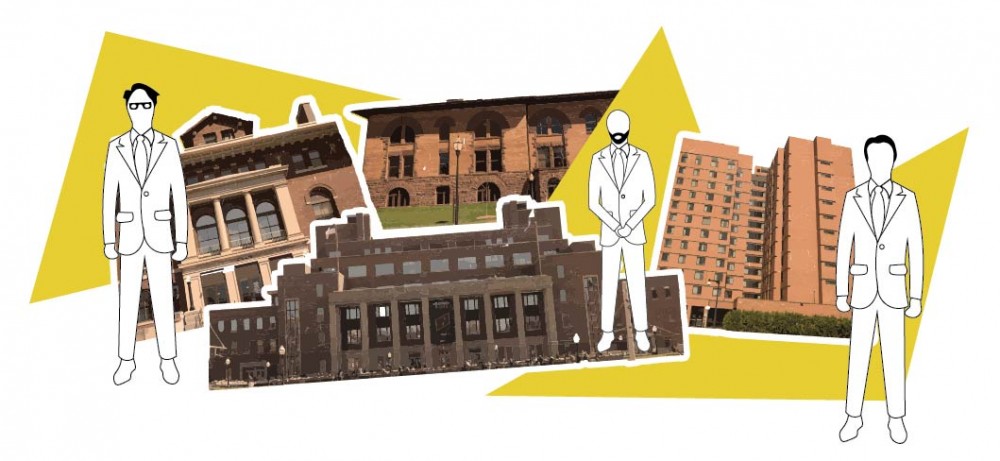The debate over building names at the University of Minnesota hinges on different approaches to interpreting the same historical archive.
After a University task force recommended renaming four buildings on campus, some members of the Board of Regents went to local archives to do their own research. However, several historians familiar with contextualizing higher education archives and assessing the actions of historic figures see the regents’ approach to this historical debate as insufficient.
On one hand, some historical experts say they take a broad view of archival documents and give more weight to contextual evidence. On the other, some members of the Board of Regents say they don’t see enough evidence in a University task force’s report to back up allegations of racism and anti-Semitism against four former administrators.
Several regents — including Michael Hsu and Darrin Rosha — have come to a different conclusion on the same historical record used to assess the thoughts and actions of former University administrators Lotus Coffman, Edward Nicholson, William Middlebrook and Walter Coffey.
Hsu has said the University can’t move forward with renaming without the board understanding all of the evidence. He’s accused the task force of “academic dishonesty” and intentionally omitting evidence from its 125-page report.
Both Hsu and Rosha said their criticisms of the report are rooted in analysis of evidence included by the task force, as well as documents left out of the report.
“I have yet to take my focus off of the factual analysis,” Rosha said. “I haven’t gotten past getting clarification on the actual factual underpinnings. And once we have that, then I think we move to the next stage.”
But Robert Cohen, a professor of higher education history at New York University, said the evidence has been there for years. Cohen studied Coffman and Nicholson’s attempts to surveil students while writing his first book in the 1980s.
“As a scholar of this era, this stuff is not even controversial to me. Nothing in this report surprises me at all,” he said.
Cohen said a report this thorough is highly unusual. It’s impressive, he said, but its recommendations are daring.
“Really the issue is what do you do about the building naming. That, to me, is really what the controversy is,” he said. “What do you do with this history? Not, ‘Is this history accurate?’ because it certainly is.”
Stephen Kantrowitz, a history professor, was on a task force charged with considering the history of the Ku Klux Klan at the University of Wisconsin-Madison. He said delving into an archive can be complex.
“Anybody is free to go into an archive and explore, and many people are good at it,” he said, but historians are trained to assess what they find in relationship to other archives and to what other scholars have found. They can sometimes see things others wouldn’t, he said.
“It’s rarely the case that a single document tells you something so dramatically new that it upends everything else that you already knew,” he said.
Rosha said he’s gone to the Minnesota Historical Society multiple times, analyzing correspondence between Nicholson and former State Auditor Ray Chase. The task force report said Nicholson and Chase worked together to “identify groups and individual students as potentially dangerous based on their political leanings.”
Rosha has criticized the task force’s “inferences” about Nicholson, saying the report mischaracterized Nicholson as an anti-Semite without sufficient evidence.
“I have not seen a single document or anything of that variety, nor have I seen a single document that can be attributed to Dean Nicholson with any anti-Semitic indication at all,” Rosha said. “It’s absolutely stunning for someone to put that allegation toward someone without any evidence that they held those views.”
Deborah Dash Moore, a professor of Jewish history at the University of Michigan, said anti-Semitism at that time wasn’t so explicit. In the 1930s, “communist” was used as a stand-in for “Jew.”
“If you have a guy like Nicholson spying on the left-wing students, he’s really spying on the Jewish students,” she said.
If there is direct evidence to indicate Nicholson’s bigotry, “Show me,” Rosha said. He sees that as “moving the goal post” because there’s still lacking evidence about Nicholson’s beliefs.
In Hsu’s view, the evidence shows that Coffman and other administrators only acted under their bosses’ guidance, pointing to minutes from the Board of Regents that show unanimous board support for a segregated housing policy.
Hsu said he’s spent hours in the University’s Andersen Library archives analyzing historical documents, focusing on the file of former Regent Fred Beal Snyder, who was on the board during Coffman’s tenure.
“I’ve looked at thousands of pages. I’ve probably looked at more pages and documents than the people on the task force have,” he said.
But Moore said that’s not how a historian would assess that history. “You have to recognize when you’re doing history that the individuals that you’re studying have a certain amount of what historians call ‘agency.’ They have the possibilities of acting. They’re not puppets.”
Coffman was undoubtedly influenced by the regents and by the ideas of his time, Moore said. “And yet, you see when [Ford] comes in, he changes it. So, clearly, there wasn’t so much prejudice that a kind of moral leadership couldn’t have an effect.”
James Farnsworth, a member of the Minnesota Student Association, also went to the Minnesota Historical Society to look at documents with Rosha and Hsu.
But Farnsworth, who supports renaming, said the archives “didn’t really change anything that I was thinking so far.”
“For me, I understand why the archives are being looked at. I certainly respect the regents right to take this governance question as they please,” he said. “But if I was a regent, I would really be focusing on process and conversations about how to move forward.”

















